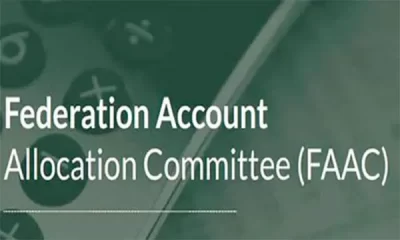BUSINESS
PIA: IoD Points at Ways to Facilitate Successful Implementation

The Institute of Directors (IoD) on Monday highlighted important areas to be reviewed by the authorities to engender the successful implementation of the Petroleum Industry Act (PIA).
Dr Ije Jidenma, President, IoD, gave the advice in a policy paper titled: “Making the Petroleum Industry Act work: A Position Paper,” on Monday in Lagos.
Jidenma said that while there was no such thing as a perfect piece of legislation, recent events pointed to implementation ‘headwinds.
She stressed that Nigeria in its implementation of the PIA must send the right signals consistent with the outlined noble objectives.
Jidenma outlined the institute’s concern with its implementation to include stalled downstream deregulation, implementation complexities, need for gas investment incentivising, and Environmental, Social and Governance (ESG) issues.
According to her, the Federal Government’s decision to stall the Act raised further questions on section 53 (7) which requires “NNPC Ltd and any of its subsidiaries to conduct their affairs on a commercial basis in a profitable and efficient manner without recourse to government funds.”
This, she said, was highlighted in view of the sum of $341 billion (or N1.43 trillion) which was reported to had been spent in 2021 on petroleum subsidy.
Jidenma tasked government to create an enabling environment that would make implementation of deregulation easier and readily acceptable.
“Pending their full privatisation, government must fast-track the ongoing full rehabilitation of refineries to ensure that the import freight element in the price of product is minimised;
“Government should review the current fuel pricing mechanism and must as a matter of urgency, work on removing all the inefficiencies and distortions that are negatively impacting the landing costs of products,” she said.
She noted that feedback from the business community suggested that some aspects of the Act might prove difficult to implement in practice because of inherent complications.
Jidenma cited two examples that would suffice as: the hydrocarbon tax and Company Income Tax (CIT) overlap and conversion from existing Oil Prospecting License (OPLs) to the new Petroleum Prospecting License (PPLs).
She noted that while section 302 (1) states that CIT shall apply to companies engaged in petroleum operations (upstream, midstream and downstream), section 260 (1) states that Hydrocarbon Tax shall apply to companies upstream: onshore, shallow water and deep offshore.
“Hence, upstream firms would be subject to both Hydrocarbon Tax and CIT.
“Section 92 (1) allows for the voluntary conversion of existing oil prospecting license (OPL) to a petroleum prospecting license (PPL).
“However, the OPLs cover a larger size of 2,950 square kilometres while the new PPLs depending on terrain cover 300 square kilometres (onshore and shallow offshore) and 1,000 square kilometres (deep offshore).
“Conversion may not be as straight- forward as anticipated by the Act.
“To reduce the pain from implementation complexity, IoD Nigeria is putting forward the need to develop a uniform template for dealing with overlaps; and provide greater clarity on voluntary lease conversion and a clear timeline,” she said.
She recommended the exemption of non-associated gas producers and developers from disallowing borrowing cost for the purpose of CIT computations.
“State an objective basis for determining the length of the transition from a regulated regime to a ‘willing-buyer, willing-seller’ gas market.
“Except where it is strictly in the public interest, undue price regulation should be avoided,” she said.
The IoD President noted that while there was evidence that the PIA attempted to incorporate ESG principles, there were many ‘missing links.
She said that the Act failed to encourage or mandate sustainability reporting.
Jidenma added that the NNPC Ltd Board reflected a degree of gender diversity but that might not be true of the Commission and Authority.
According to her, a review reveals that only one in six appointees in the boards of NNPC and the two regulatory authorities, put together, are women.
She said that there were no prescription on the matter for other boards of companies in the petroleum operations space.
“In view of Nigeria’s declared commitment to Net-Zero 2060 at the CoP26 held in Glasgow, UK – three months after the Act was signed – it is important that urgency implied by the commitment is reflected in the speed and implementation of the PIA.
“The Act ought to include a specific penalty for failure to comply with section 103 and for environmental damages.
“While it is commendable to have in place trusts and plans that cater for host communities, it is important to ensure related funds are well-managed and properly accounted for, if the desired socio- economic growth will result.
“Equally important is for all players, as a matter of good practice, to incorporate sustainability reporting as part of applying ESG principles.
“The Act should prescribe what companies engaged in petroleum operations (upstream, midstream and downstream) should consider adequate gender balance,” she said. (NAN)
BUSINESS
Moniepoint, NBCC Push for Transparent Financing to Unlock SME Growth

Moniepoint Inc. and the Nigerian-British Chamber of Commerce (NBCC) have urged faster, transparent and human-centered financing models to unlock growth and secure the future of Nigerian SMEs.
They made the call on Thursday in Lagos at the NBCC and Moniepoint SME event with the theme: ‘Money in Motion: Unlocking Capital, Driving SME Prosperity.
’Senior Vice President, Distribution Network Sales, Moniepoint Inc.
, Ezekiel Sanni stated that access alone was not enough in 2025.He noted that while the financial sector had ensured capital availability, SMEs still lacked speed, context, trust, and sufficient transparency in financing processes.
This, Sanni explained, meant SMEs continued to face delays, harsh terms, and opaque conditions when seeking financial support.
He stressed that Moniepoint’s experience with SMEs showed that capital must be simple, fast, supportive, and human-centred to drive real business growth.
He urged NBCC to strengthen its role as a bridge between policy and enterprise, local businesses and international markets, and between capital and capacity.
According to him, NBCC’s key tasks include advancing SME-friendly trade finance, promoting digital literacy and inclusion, advocating fair digital lending regulations, and fostering UK–Nigeria SME partnerships.
“To drive SME prosperity, we must engineer systems that move capital at the speed of trust and make SMEs visible, creditworthy and scalable.
“We must reframe success from how much was disbursed to how many lives changed.
“Across Nigeria, SMEs are ready to scale and grow. We must ensure that capital reaches them quickly and effectively,” Sanni said.
Vice President, Credit Portfolio Management, Moniepoint, Tolulope Alegbe said access to finance was critical, but loans could only help when businesses were “loan ready.”
He listed benefits of loan readiness as faster funding, improved loan terms, stronger credibility with banks and investors, and better positioning for scale and opportunities.
Alegbe said Moniepoint applied a four-pronged approach to strategic lending for small businesses.
These included digital payment records functioning as financial history, tailored working capital loans, data-driven credit assessments, and advisory support to improve financial practices.
He noted that although SMEs needed loans for operations, many avoided formal institutions when seeking funds.
Alegbe cited Moniepoint’s informal SME report, which showed over 70 per cent borrowed from family and friends, compared to 15.1 per cent from loan apps, and 12.2 per cent from banks.
He argued that solutions lay in alternative collateral, digital payments, traceable records, data-driven credit scoring, and risk-sharing guarantee schemes.
“To build creditworthiness, businesses must keep proper records using digital payments and bookkeeping to create reliable financial histories.
“They must also separate and formalise finances, start with small loans, repay consistently, and grow access to larger facilities.
“At Moniepoint, we believe credit should not be a privilege but a pathway to growth. When businesses are ready, responsive lenders will help SMEs thrive,” Alegbe said.
President of NBCC, Abimbola Olashore, said empowering entrepreneurs created jobs, fostered innovation, and laid a stronger foundation for sustainable economic growth.
Olashore affirmed NBCC’s commitment to promoting trade and investment between Nigeria and the United Kingdom.
He said the SME event showed that NBCC’s mission extended beyond trade to knowledge, innovation, and capacity building, which were vital to SME success globally.
“Let us seize this moment as a call to support SMEs, strengthen trade ties, and create opportunities shaping the future of enterprise in Nigeria,” he said.
BUSINESS
FG’s Loan Facilities Viable to Boost Export Trade – NEPC

The Nigerian Export Promotion Council (NEPC) has described loan and grant facilities provided by the Federal Government as viable tools to boost export trade.
Coordinator of the NEPC in Imo, Anthony Ajuruchi, said this at an engagement forum of non-oil exporters with trade-related agencies, organised by the council, in Owerri, on Wednesday.
Ajuruchi said that with support from government agencies, the export market in Imo and Nigeria at large can afford to expand and compete with global markets.
He urged exporters in Imo to take advantage of the soft loans and grants being provided to grow their businesses.
The Imo/Abia Coordinator of the Nigeria Incentive-Based Risk Sharing System for Agricultural Lending (NIRSAL), Austin Ikeh, said that the forum provided a good avenue to reach actors across the value chain.
Ikeh said that with collaboration with the Nigeria Export Import (NEXIM) Bank, the government can provide support for farmers and exporters.
He advised exporters to get the required certifications by regulating agencies and knowledge of the export business to enable them access government facilities.
Also speaking, Freeman Godwin, the Chief Executive Officer of Belarhem Dynamic International Ventures, exporters of edible food items, identified poor management of goods by airline operators as a major challenge.
He called for improvements, adding that exporters cannot afford waste loan facilities.
“Sometimes, I’ve had to count my losses after experiencing damages to my goods at the warehouse as a result of poor preservation and management by the airlines”, he said.
| ReplyReply allForwardAdd reaction |
BUSINESS
Bolt Enhances Rider Safety with Dashboard Camera

Ride-hailing platform Bolt is introducing a new safety feature for its drivers in Nigeria, turning smartphones into dash cams (dashboard cameras) through a partnership with US-based Driver Technologies.
The app, which records both the inside and outside of vehicles, has long been requested by drivers seeking protection in disputes and insurance claims.
Bolt said the collaboration will give driver partners one free month of the premium Driver app, after which they can subscribe at a discounted N4,810 ($3. 50) per month. Recordings are stored in the cloud and can be accessed or shared when needed.“Driver partners regularly tell us that a dash cam can provide them with additional security and peace of mind,” Bolt Nigeria’s General Manager, Osi Oguah, said.
“But buying a device that meets their requirements can be expensive, with drivers citing the cost as the main obstacle.”The rollout highlights how African ride-hailing markets are adapting global safety tools to local contexts, where high hardware costs often make add-ons like dash cams inaccessible.
“By providing discounted access to premium dashcam functionality, our partnership with Driver Technologies ensures they can access the tools they need to create safer environments for themselves and their passengers,” he said.
The app, which can run in the background while using the Bolt platform, offers picture-in-picture functionality to confirm recording is active without interfering with ride-hailing operations. The system enables drivers to store, access, and share footage through the Driver Cloud, supporting them in disputes with customers, insurance claims, or investigations by law enforcement.
Bolt said the new feature complements its existing in-app safety tools such as pick-up codes and Trusted Contacts. It also follows recent investments in Nigeria and other African markets to bolster rider and driver safety.
For Driver Technologies, the collaboration marks an expansion of its footprint in emerging markets. The company will provide IT support and data management services for Nigerian drivers under the partnership.
Founded in 2013, Bolt operates in more than 600 cities across 50 countries, with over 4.5 million drivers on its platform globally. The company said the Nigeria initiative underscores its push to strengthen driver welfare and security across its African operations, one of its fastest-growing markets.





















